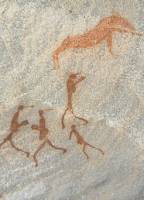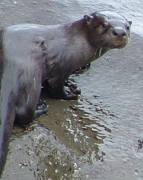Most of us are (mostly) hairless. That is very unusual among mammals and pretty much unique among primates.
Why have humans evolved this trait? This New Scientist article outlines some of theories offered over the years.
We still don’t have a conclusive answer.
Theory 1: Avoiding the heat
 As humans became savanna hunters body hair was shed to avoid overheating during long runs.
As humans became savanna hunters body hair was shed to avoid overheating during long runs.
I have blogged before about theories suggesting that the human combination of hairlessness and profuse sweating allows for persistence hunting.
The problem:
Why has no other mammal adopted this strategy?
Many other mammals would benefit from better cooling systems and they all have fur – what is so different about us? Fur actually insulates against heat and the sun as well as keeping us warm in the cold.
Theory 2: Side-effect of big brains
This theory suggests that nakedness is a side effect of growing larger brains. It was noted that:
- Human brains grow very rapidly just before birth
- Humans retain characteristics of juvenile apes (flatter faces, bigger heads and eyes and naked skin).
The idea is that the stage just before birth has been protracted to allow the brain to grow even larger.
The problem:
If having hair were an advantage then we would just grow hair later in life. For example, we grow teeth even though we aren’t born with teeth.
Theory 3: No ticks here
Another theory is that we lost our hair in order to avoid ticks and other parasites.
The problem:
Why only us? If this were really an advantage other mammals would have evolved the same thing.
Theory 4: Aquatic ape
Humans are hairless and have a thin layer of fat under their skin. Sounds like whales and dolphins right?
The idea is that our evolutionary ancestors went through a stage evolving in aquatic environments. This could also help to describe why we walk upright.
 The problems:
The problems:
There are many problems with this theory (read about them on Wikipedia). For example, humans can’t hold their breath very well and are not efficient swimmers.
Most importantly, hairlessness is only an advantage in fully aquatic species like dolphins and whales. Even full time swimmers like otters and seals have thick fur and swim superbly. In short, the aquatic ape theory doesn’t work all that well…
 So, positive thoughts do help – but only if you believe them.
So, positive thoughts do help – but only if you believe them.